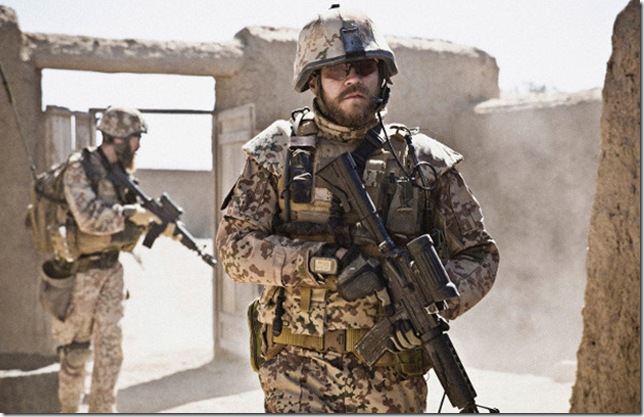We’re just minutes into Tobias Lindholm’s A War when the first IED explodes in a heretofore tranquil stretch of desert in Afghanistan. The 21-year-old soldier struck by the device dies moments later, leaving his fellow-troops shaken, grieving and enraged — questioning the direction of their mission, fighting a deluge of tears and snot, asserting that they’re not cut out for another day fighting an elusive, un-uniformed enemy.
There will be more carnage to come, the shrapnel both physical and psychological, in a film that understands the confusing morass of modern warfare, the way peace can disintegrate into a bloodbath within seconds. The troops in question are Danish, part of Denmark’s small NATO-led coalition. But of course, the suffering, trauma and bleak reality of soldiering in an endless Middle Eastern war is tragically universal.
So is the disconnect between home and abroad. For the first half of A War — which is nominated for Best Foreign Language Film at this weekend’s Academy Awards — Lindholm, who directed the gripping 2012 thriller A Hijacking in 2012, divides his screen time between the military company led by commander Claus M. Pedersen (Pilou Asbaek) and his family back home, where his wife Maria (Tuva Novotny) faces her own everyday barrage of challenges raising their three young children.
Husband and wife keep each other informed over the phone, and in these scenes, Lindholm makes a decisive choice. Other directors might cut between Afghanistan and Denmark, but when we’re following Maria’s narrative, the director never shows us Claus on the other end, and vice versa. It sounds like a small thing, but it’s everything, because it reinforces the impossible distance — psychic as well as geographic — between military and civilian life.
A War is about many things, but chief among them is the notion that most of cannot comprehend, and in most cases can’t judge, the decisions of commanders on the battlefield, especially one as nebulous and ever-shifting as Afghanistan. We soon learn that Claus has been accused of a war crime that left 11 civilians dead, and in the second half of the film, A War transitions from Hurt Locker-like war zone naturalism to an equally intense courtroom drama predicated on a commander’s split-second decision made in the fog of war.
Questions of morality, loyalty, empathy and protocol dominate this elegantly structured antiwar meditation, in which the lives of anonymous Middle Eastern children are inherently weighed against the Pedersens’ cute and troubled tykes. It poses debates with no correct answer, because war is fundamentally incorrect. It brings out the cognitive dissonance in its spectators: Even as the prosecution appears to be right in its assertions, we desire an acquittal for commander Pedersen anyway. When war itself is a crime, how can we isolate one incident of fatal judgment?
That A War is able to explore such philosophically weighty topics — condensing a class in wartime ethics into two hours — while filling the screen with harrowing suspense and deeply affecting moments of heart-in-your-throat humanity is a cerebral balancing act few directors could juggle so successfully. I doubt A War will upset Son of Saul at this weekend’s Oscars, but it’s every bit the film’s equal.
A WAR. Director: Tobias Lindholm; Cast: Pilou Asbaek, Soren Malling, Dar Salim, Tuva Novotny, Charlotte Munck; Distributor: Magnolia; Rating: R; Opens: Saturday at Coral Gables Art Cinema
